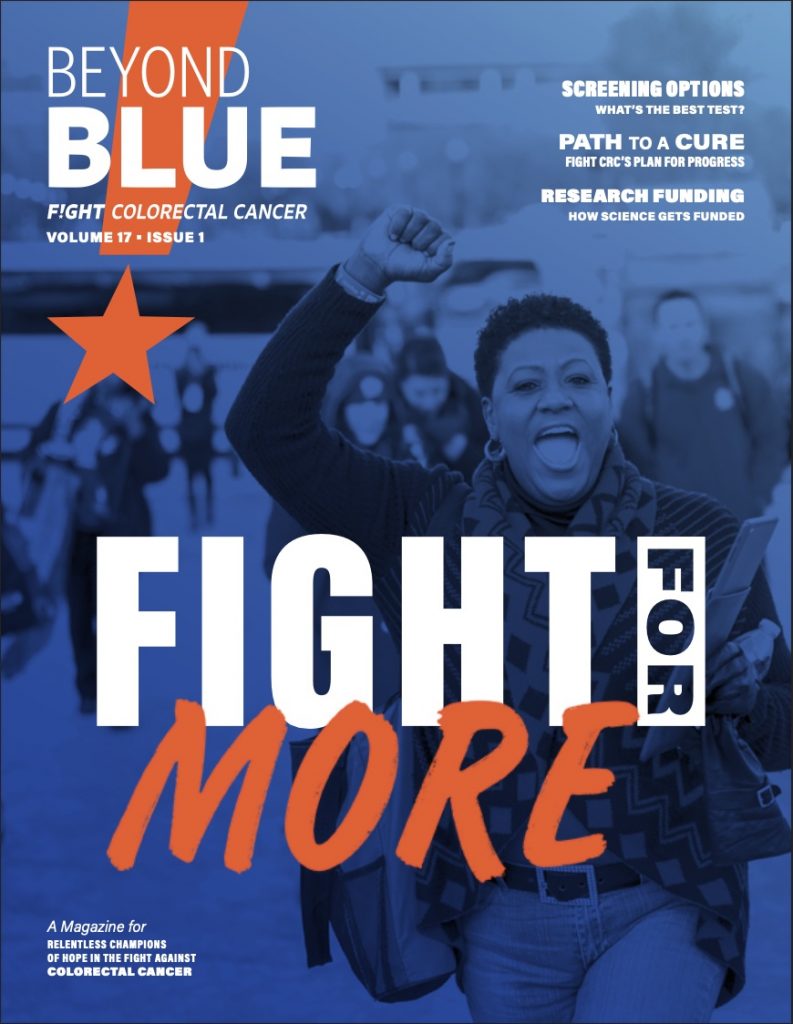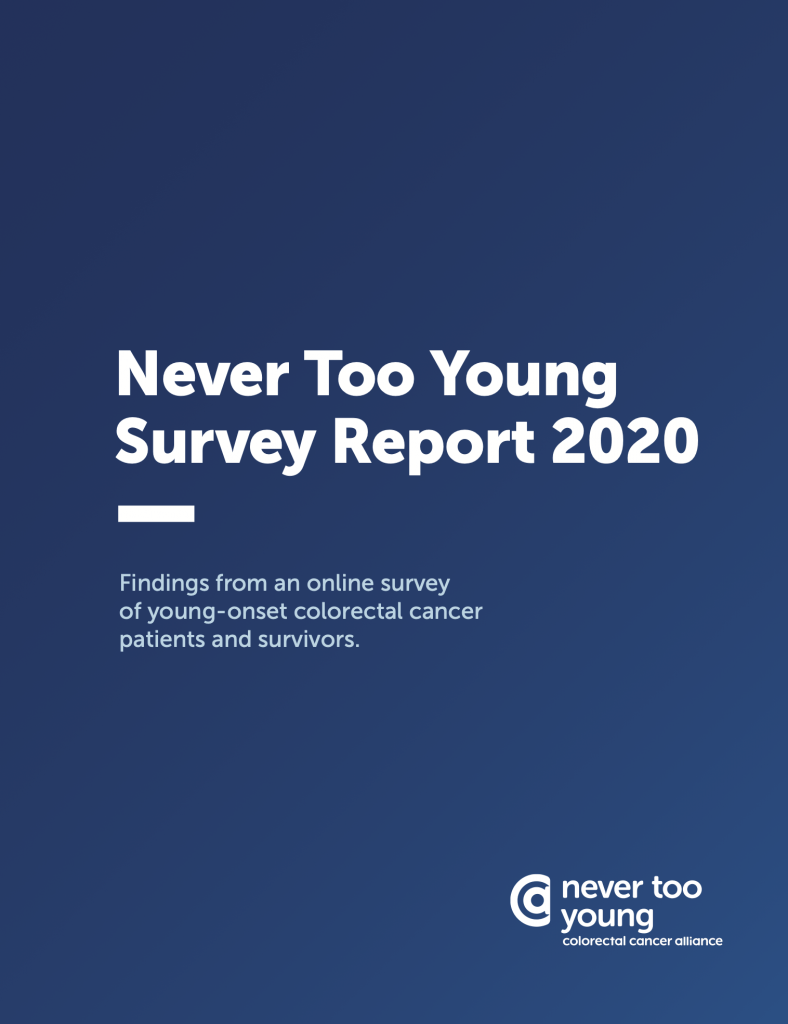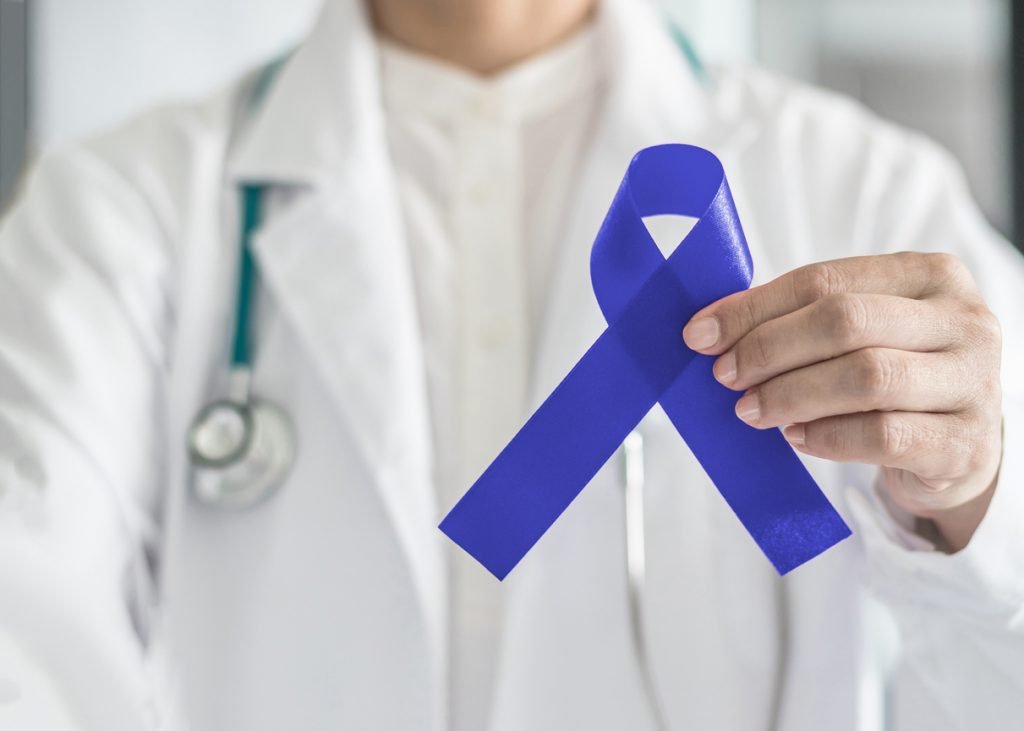Awareness
Research
Young-onset colorectal cancer cases are increasing.
By the year 2030, the number of young-onset colon cancer diagnoses is predicted to double and the number of young-onset rectal cancer diagnoses is expected to quadruple.
One in ten new cases are diagnosed before the age of 50.
The Numbers
of young people with colorectal cancer are diagnosed at advanced stages
of colon cancer diagnoses occur in people under 50 in the US
of rectal cancer diagnoses occur in people under 50 in the US

What you can do
- Be aware of the signs and symptoms
- Listen to your body
- Know your family health history
- Maintain a healthy, active lifestyle
- Speak up if you feel something is wrong
Signs & Symptoms
If you experience any of these symptoms, contact a physician immediately.
Ongoing change in bowel habits
Blood in stool
Rectal bleeding
Frequent gas or bloating
Weakness and fatigue
Unexplained weight loss
Anemia
Abdominal Pain

Resources
Memorial Sloan Kettering Cancer Center
Memorial Sloan Kettering Cancer Center (MSK)—the world’s oldest and largest private cancer center—has devoted more than 130 years to exceptional patient care, innovative research, and outstanding educational programs. Today, it is one of 51 National Cancer Institute–designated Comprehensive Cancer Centers, with state-of-the-art science flourishing side by side with clinical studies and treatment. The close collaboration between MSK’s physicians and scientists is one of its unique strengths, enabling it to provide patients with the best care available as researchers work to discover innovative ways to prevent, control, and cure cancer. MSK’s education programs train future physicians and scientists, and the knowledge and experience they gain makes an impact on cancer treatment and biomedical research around the world.


Beyond Blue Magazine
Beyond Blue is a magazine written for colorectal cancer survivors, by survivors. Published every spring, this free resource covers topics and issues relevant to survivors from tips and advice to current news regarding colorectal cancer care.
It is distributed around the country each spring and fall to healthcare facilities or is available for download via the button below.
Fight CRC March 2020 Impact Report
Fight Colorectal Cancer (Fight CRC) is the leading patient-empowerment and advocacy organization in the United States, providing balanced and objective information on colon and rectal cancer research, treatment, and policy. We are relentless champions of hope, focused on funding promising, high-impact research endeavors, while equipping advocates to influence legislation and policy for the collective good.
Rachel’s mother is a Fight CRC Advocate. Advocates work year-round in Washington, D.C., pushing for legislation that supports colorectal cancer patients and their families. We also bring colorectal cancer advocates to Capitol Hill every March to tell their stories to legislators, turning their pain into purpose, and passion into action.
Each March, Fight CRC issues an Impact Report to raise awareness of the importance of screening for colorectal cancer.


Early Onset CRC Executive Briefing 2020
There is an alarming increase in Early Onset Colorectal Cancer (EOCRC) over the last decade. EOCRC is defined as a diagnosis between ages 20 – 49. This briefing has been developed to support our Primary Care Providers (PCPs) in decreasing the incidence and mortality of these young patients through education and prompt evaluation of symptoms.
Young-Onset Colorectal Cancer Survey Report
Every year, the Colorectal Cancer Alliance launches its annual survey of young-onset colorectal cancer patients, survivors and caregivers. The Alliance uses the survey to learn about and track the self-reported medical, psychosocial, and quality of life experiences of these often overlooked groups.
This year, the Alliance solicited participation over social media, email, and web-based communities
Younger patients diagnosed between the ages of 19-39 were more likely to report that their concerns were dismissed by their doctors than patients who were diagnosed between the ages of 40-50.
Women were more likely to report that they felt their symptoms and concerns were dismissed by their doctor.
54% of survey respondents were misdiagnosed, 43% with hemorrhoids alone or in combination with other conditions, 17% with anemia alone or with other conditions, 12% with irritable bowel syndrome (IBS) alone or with other conditions, and a startling 11% with mental health issues either alone or with other conditions.


ND Colorectal Cancer Roundtable
The North Dakota Colorectal Cancer Roundtable (NDCCRT), co-lead by the American Cancer Society and the North Dakota Department of Health, is a statewide coalition of organizations dedicated to reducing the incidence of and mortality from colorectal cancer in our state, through coordinated leadership and strategic planning. The ultimate goal of the state’s Roundtable is to increase the use of proven colorectal cancer screening tests among the entire population for whom screening is appropriate. Please access the screening report to learn more about the prevalence of colorectal cancer in the state of North Dakota and efforts being made by the medical community to become more informed and diligent in screening for it.
The Path to a Cure
The Path to a Cure report is broken down into 4 sections. Each section in the report provides progress indicators, key messages, opportunities and challenges, and the voices of survivors. Each indicator has a plan of action to ensure that all partners, collaborators, and champions play a role in contributing a path to a cure!
1) Biology and Etiology
2) Prevention and Early Detection
3) Treatment
4) Survivorship and Recurrence
We are committed to greater engagement and collaborative action to make an impact in creating colorectal cancer advancements. Will you fight with us?


Know Your Family History
Family history plays an important role in determining your cancer risk. About 1 in 4 colorectal cancer patients have a family history of colorectal cancer. Family history means any of the following are true:
- At least one immediate family member (parent, brother, sister, child) was diagnosed under the age of 60.
- Multiple second-degree relatives (grandparents, aunts, uncles, etc.) were diagnosed with colorectal cancer or advanced polyps (risk increases if diagnosed before the age of 45).
Never Too Young Program
Colorectal cancer is affecting a rising number of young people. We’re committed to learning more about it and providing support to young-onset CRC patients and survivors.
The Alliance’s Never Too Young (N2Y) Program, with the support of a dedicated Advisory Board, is changing how the world sees this disease. Together, we’re increasing awareness, building a community, and learning more about young-onset colorectal cancer.


Know the Facts
Colorectal cancer has become a reality for many people younger than age 50, and it’s the only population with a rising incidence rate.
By 2030, researchers predict that colorectal cancer will be the leading cause of cancer deaths in people ages 20-49.
Researchers have not concluded why young-onset colorectal cancer is on the rise, but the Alliance is funding research to help find out.
Young Adult Colorectal Cancer
Many young adults are being overlooked because screening doesn’t typically begin until age 45 or 50, due to evidence-based guidelines.
A debate exists whether it’s worth it to begin screening at an earlier age, considering risk factors and barriers that come with medical procedures such as the risk of perforation, taking off work, etc.


Loving That Journey for Me
March is Colorectal Cancer Awareness Month — a statement I may not have given a second thought to, until last year. Now, every day is Colorectal Cancer Awareness Month. At 38, on my way to an annual OB-GYN appointment, I told my husband to expect me home soon. At this visit, I first heard the word “mass,” a growth that should not be where it was. It was July 1. I remember dates now, something I never paid much attention to earlier. By July 22, my diagnosis was confirmed, stage 3 colorectal cancer, due to the size of the tumor.
Within the span of a few weeks, I — an active mother of two young children, used to watching my son play baseball and my daughter dance, and overseeing homework and playdates — started hearing words like “staging,” “radiation,” “chemotherapy,” and “colectomy.”
Taking Care of Young Patients


Rectal Cancer Disappears After Experimental Use of Immunotherapy
Four people were successfully treated for rectal cancer using immunotherapy treatment during a study at the Memorial Sloan Kettering Cancer Center.
Immunotherapy harnesses the body’s own immune system as an ally against cancer. The MSK clinical trial was investigating — for the first time ever — if immunotherapy alone could beat rectal cancer that had not spread to other tissues, in a subset of patients whose tumor contain a specific genetic mutation.
Rachel's Remarkable Ride
In the months before her death, Rachel began to express not only how she was feeling and dealing with her diagnosis, but also encouraged others to express how they felt. She sat at a table on the 46th floor of her apartment building with a panoramic view of the New York skyline and the Statue of Liberty and began to write her blog.
If you knew and loved Rach, you may have already read it. If you haven’t, you are encouraged to do so. The messages she shares will provide strength and inspiration to help you overcome whatever challenges you are facing in your life. You can find her here.
